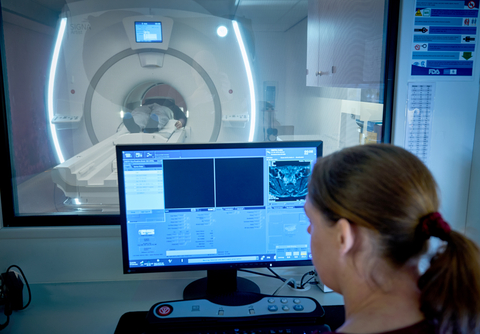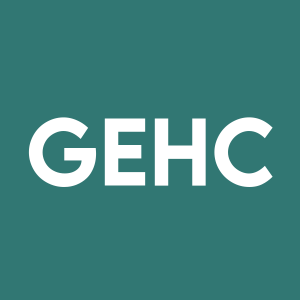GE HealthCare Announces Phase I Results for a First-of-its-Kind Macrocyclic Manganese-Based MRI Contrast Agent
-
Results of the Phase I clinical trial, presented at the bi-annual Contrast Media Research symposium in
Oslo, Norway , conclude that this novel macrocyclic manganese-based contrast agent was well tolerated with no serious adverse events, dose-limiting toxicities or clinically relevant findings reported. - If approved, this agent could provide an alternative to gadolinium-based contrast agents and address the potential impact of post-patient excreted gadolinium in the environment.
- The clinical trial program demonstrates GE HealthCare’s commitment to innovation in contrast media and to building a portfolio of MRI imaging agents to address radiologists’ needs for their patients.
CHALFONT ST GILES,

A radiologist looking at MRI exam images (Photo: Business Wire)
MRI contrast agents, which are typically gadolinium-based, are used to enhance visualization of abnormal structures or lesions and to aid differentiation between healthy and pathological tissue. This macrocyclic, extra-cellular, general-purpose, manganese-based contrast agent has comparable relaxivity (the ability to enhance signal intensity) to gadolinium-based agents and is expected to be diagnostically similar to current gadolinium-based products. Unlike gadolinium, manganese is naturally occurring in - and efficiently eliminated - from the body. Along with its suitable image-enhancing properties, this manganese-based agent could be a viable alternative to gadolinium, particularly in light of perceived concerns relating to gadolinium retention and the potential impact of post-patient excreted gadolinium in the environment.
Dr Paul Evans, Head of Global R&D at GE HealthCare’s Pharmaceutical Diagnostics business segment, said, “These are encouraging Phase I results for this manganese-based contrast agent and we look forward to completing the next steps in the clinical development process. This is part of our pipeline of products aiming to improve patient outcomes across care pathways.”
Dr Robert J. McDonald, Radiologist at Mayo Clinic and Contrast Media Safety Committee Board member for the American College of Radiology, whose group has collaborated with GE HealthCare during the research phase, commented, “GE HealthCare’s manganese-based contrast agent could offer benefits such as reduced risk of tissue deposition and improved safety for certain vulnerable patient populations compared to gadolinium-based agents, while also providing comparable imaging capabilities and potentially lower environmental impact.”
The Phase I trial was undertaken at the clinical research unit at Oslo University Hospital, Rikshospitalet,
Kevin O’Neill, President and CEO of GE HealthCare’s Pharmaceutical Diagnostics segment, added, “As we celebrate milestone anniversaries for these two facilities, the Phase I results are a reminder of Norway’s heritage of innovation that has shaped the field of diagnostic imaging, improving patient outcomes worldwide. We aim to offer more choice to radiologists, delivering a broad portfolio that can enable personalized care and address unmet patient needs.”
GE HealthCare’s Pharmaceutical Diagnostics unit is a global leader in imaging agents used to support 120 million procedures per year globally, equivalent to four patient procedures every second. For more than 40 years, GE HealthCare contrast media has been routinely used across MRI, X-ray/CT and ultrasound to enhance clinical images and support diagnosis.
About GE HealthCare Technologies Inc.
GE HealthCare is a leading global medical technology, pharmaceutical diagnostics, and digital solutions innovator, dedicated to providing integrated solutions, services, and data analytics to make hospitals more efficient, clinicians more effective, therapies more precise, and patients healthier and happier. Serving patients and providers for more than 125 years, GE HealthCare is advancing personalized, connected, and compassionate care, while simplifying the patient’s journey across the care pathway. Together our Imaging, Ultrasound, Patient Care Solutions, and Pharmaceutical Diagnostics businesses help improve patient care from diagnosis, to therapy, to monitoring. We are a
Follow us on LinkedIn, X , Facebook, Instagram, and Insights for the latest news, or visit our website https://www.gehealthcare.com/ for more information.
View source version on businesswire.com: https://www.businesswire.com/news/home/20241004850403/en/
GE HealthCare Media Contact:
Mathilde Bouscaillou
M +33 6 47 00 82 71
mathilde.bouscaillou@gehealthcare.com
Source: GE HealthCare







